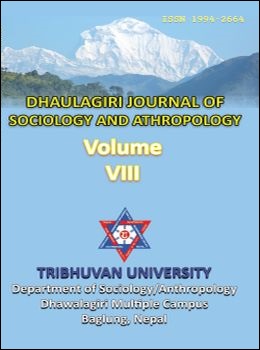Afno Manchhe: Unequal Access to Public Resources and Institutions in Nepal
DOI:
https://doi.org/10.3126/dsaj.v8i0.10722Keywords:
Afno Manchhe, Guanxi, Corruption, NepotismAbstract
This paper highlights the informal inner circle network approach to maintaining relationships and reciprocating favors within a system that significantly affect the performance of incumbents in formal bureaucratic organizations. While this is a general sociological problem in any society, this article deals with how afno manchhe behavior is manifested in Nepal. Without afno manchhe relations, one risks marginalization, disappointments and failures in one's struggle to realize important goals in life. In such a situation, the malfunctioning of administration and dissatisfaction arise at every level. There is thus a significant relationship between one's position in afno manchhe networks and inclusion-exclusion processes. This of course has consequences for the widespread practice of corruption in Nepal.
DOI: http://dx.doi.org/10.3126/dsaj.v8i0.10722
Dhaulagiri Journal of Sociology and Anthropology Vol. 8, 2014; 55-86




